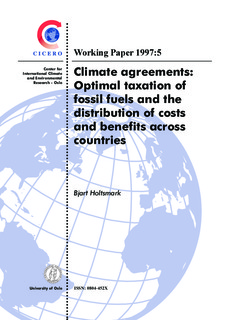| dc.contributor.author | Holtsmark, Bjart | nb_NO |
| dc.date.accessioned | 2014-03-17T14:31:04Z | |
| dc.date.available | 2014-03-17T14:31:04Z | |
| dc.date.issued | 1997 | nb_NO |
| dc.identifier.issn | 0504-452X | nb_NO |
| dc.identifier.uri | http://hdl.handle.net/11250/192164 | |
| dc.description.abstract | The paper analyses governments' response to a climate agreement that commits themselves to reducing their emissions of CO2. A formula for optimal taxation of fossil fuels in open economies subject both to an emission constraint and a public budget constraint is developed. The applied theory captures how national governments' behaviors are sensitive to the size of the benefits from revenue recycling and how these benefits adjust the distribution of abatement costs. The empirical part of the paper illustrates the significance of the participating countries’ current and potential fossil fuel taxation schemes and their role in the fossil fuel markets.
JEL classification: H21, Q48. | nb_NO |
| dc.language.iso | eng | nb_NO |
| dc.publisher | CICERO Center for International Climate and Environmental Research - Oslo | nb_NO |
| dc.relation.ispartof | CICERO Working Paper | nb_NO |
| dc.relation.ispartofseries | CICERO Working Paper;1997:05 | nb_NO |
| dc.title | Climate agreements: Optimal taxation of fossil fuels and the distribution of cost and benefits across countries | nb_NO |
| dc.type | Working paper | nb_NO |
| dc.source.pagenumber | | nb_NO |
